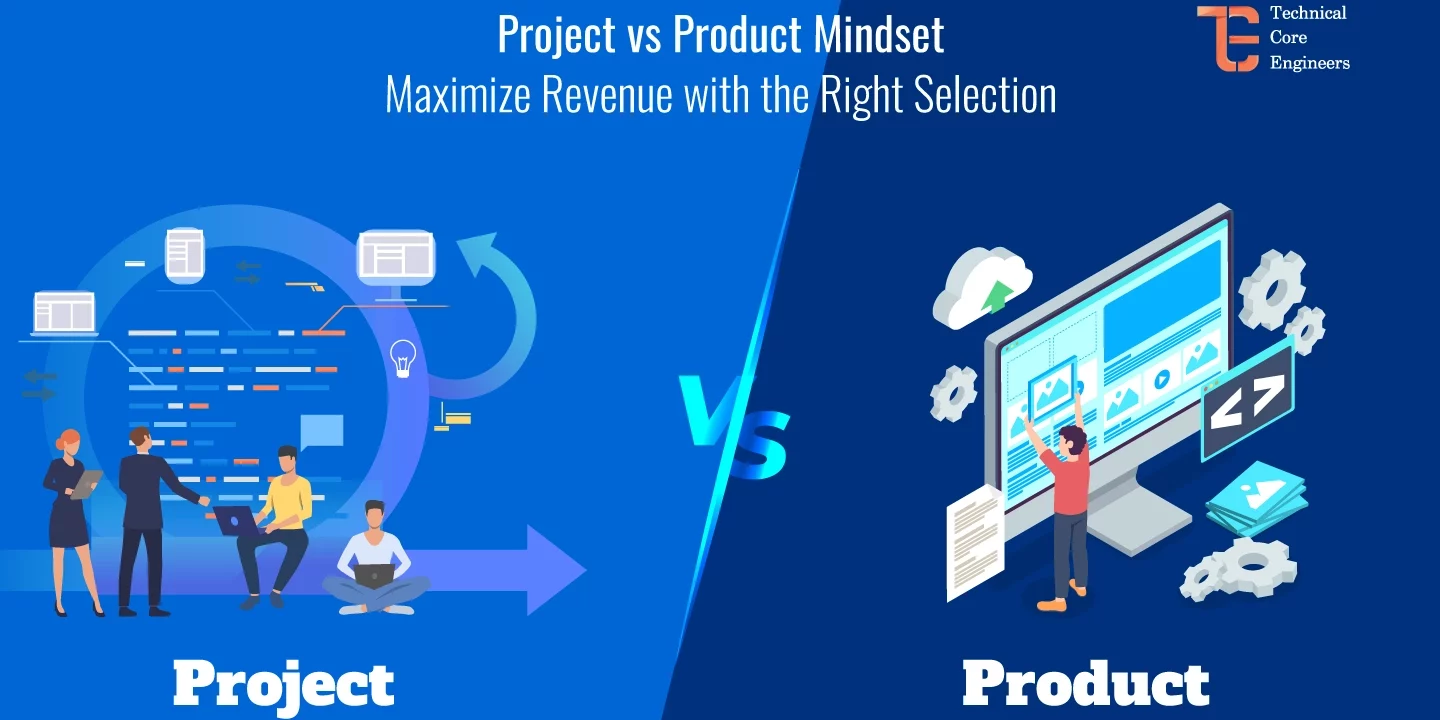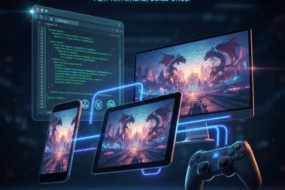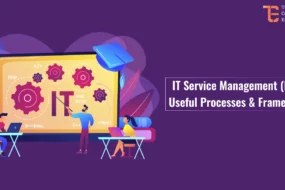- Home
- Web Development
- Project Management
- Project vs Product Mindset: Ma ...

Project vs Product Mindset: Maximize Revenue with the Right Selection. This topic is trying to understand by Technical Core Engineers. So Don’t miss read this article.
In today’s highly competitive business environment, organizations face the perpetual challenge of maximizing revenue and achieving sustainable growth. The key to this success lies in adopting the right mindset when approaching initiatives and investments.
Additionally, Tecoreng is the best It solution provider company. That is the best web and app development company in India.
Two prevalent mindsets that often come into play are the project mindset and the product mindset. Additionally, Each carries its own set of principles, strategies, and outcomes, and understanding their nuances is crucial for making informed decisions that drive profitability.
Making the right selection between the two can unlock new opportunities, streamline operations, and ultimately lead to increased profitability.
Furthermore, In this blog, we will explore the contrasting features of the project mindset and the product mindset, and how selecting the appropriate mindset can unlock new avenues for revenue generation and propel your business towards long-term success. So, If you need experts in any technology visit a Hire Team Page.
Here are some tips for maximizing revenue with the right mindset:
- Understand the goals of the project or product. What are you trying to achieve? What are the specific requirements?
- Choose the right team. The team should have the skills and experience necessary to achieve the goals of the project or product.
- Set realistic expectations. Determine what can be accomplished within the given time frame and budget.
- Be flexible and adaptable. Things will only sometimes go according to plan, so be prepared to make changes as needed.
- Communicate effectively. Keep everyone involved in the project or product up-to-date on progress and any changes to the plan.
What Is Project Mindset?

A project mindset is a strategic approach to managing initiatives that emphasize structured planning, execution, and achievement of specific objectives within a defined timeframe.
It is characterized by clear goals, limited duration, cross-functional collaboration, risk management, and a linear progression toward project completion.
Additionally, This mindset provides organizations with a systematic framework to manage temporary endeavors and deliver tangible outcomes efficiently.
In this blog, we will explore the key features and benefits of the project mindset, highlighting its significance in driving successful project execution and achieving desired results.
Key characteristics of the project mindset
Clear objectives
Projects have well-defined objectives that are usually specific, measurable, achievable, relevant, and time-bound (SMART). Especially, These objectives serve as the guiding force throughout the project’s lifecycle.
Limited duration
Projects have a fixed timeline, with a clear start and end date. So, They are temporary in nature, aimed at achieving a specific outcome or deliverable within a defined timeframe.
Focus on scope and constraints
Project management involves careful planning, resource allocation, and monitoring to ensure that the project’s scope is well-defined and adhered to. It also considers constraints such as budget, time, and available resources.
Cross-functional collaboration
Projects often require collaboration among team members from various disciplines or departments. Also, Effective communication, coordination, and integration of efforts are crucial to ensure project success.
Risk management
Projects involve identifying and managing potential risks and uncertainties. Also, Risk assessment, and mitigation strategies. Also, contingency plans are integral parts of the project mindset to minimize negative impacts on project objectives.
Linear progression
Projects typically follow a sequential or phased approach, with clear milestones and checkpoints to track progress. In fact, This allows for better monitoring, control, and adjustment as needed throughout the project lifecycle.
What Is Product Mindset?

The product mindset represents a strategic approach to business and project management that focuses on creating and sustaining valuable products or services.
Unlike the project mindset, which is time-bound and goal-oriented, the product mindset is centered around continuous improvement, long-term sustainability, and customer-centricity.
It entails viewing initiatives as ongoing endeavors that require iterative development, adaptation, and optimization to meet evolving market needs.
In this blog, we will delve into the key characteristics and advantages of the product mindset, highlighting its role in driving innovation, customer satisfaction, and business growth.
Key characteristics of the product mindset
Customer-Centric Approach
The product mindset places the customer at the center of decision-making. Also, It seeks to understand customer needs, preferences, and pain points to develop solutions that meet their demands effectively.
Iterative Development
Rather than a linear progression, the product mindset embraces an iterative approach. Also, It involves regular feedback gathering, testing, and refining to enhance the product and address any shortcomings or emerging opportunities.
Market-Driven Strategy
The product mindset recognizes the importance of market dynamics and competition. Accordingly, It involves conducting market research, monitoring trends, and adjusting strategies to ensure the product remains competitive and aligned with market demands.
Focus on Value and Differentiation
The product mindset aims to deliver customer value by focusing on unique selling propositions and differentiation. Also, It seeks to provide features, benefits, or experiences that set the product apart from competitors.
Continuous Improvement
The product mindset fosters a culture of continuous improvement and learning. It encourages experimentation, data analysis, and feedback loops to identify areas for enhancement and innovation.
Long-Term Sustainability
Unlike projects with a defined end date, the product mindset considers the long-term sustainability of the product or service. Additionally, It involves planning for product updates, expansions, and support to ensure its longevity in the market.
Embracing Change and Adaptability
The product mindset acknowledges the need to adapt and evolve in response to market changes, customer feedback, and emerging technologies. Similarly, It embraces flexibility and agility to seize opportunities and mitigate risks.
Difference Between Project Mindset and Product Mindset

The project mindset and the product mindset have distinct differences in their approaches, objectives, and outcomes. The main differences between these mindsets can be summarized as follows:
Timeframe and Duration
Project Mindset: The project mindset is focused on managing temporary endeavors with specific start and end dates. It is time-bound and aims to achieve predetermined goals within a defined timeframe.
Product Mindset: The product mindset takes a long-term perspective, considering products or services as ongoing entities. Furthermore, It emphasizes continuous improvement and adaptation, extending beyond a specific project or launch period.
Scope and Focus
Project Mindset: The project mindset is characterized by a well-defined scope, which includes specific deliverables, objectives, and constraints. So, It focuses on efficiently executing tasks and activities to meet project goals.
Product Mindset: The product mindset is broader and considers the entire lifecycle of a product or service. So, It focuses on delivering value, addressing customer needs, and evolving the product over time to maintain market relevance.
Customer Orientation:
Project Mindset: While the project mindset may consider customer requirements during the project’s execution, it primarily focuses on delivering the project’s outcomes within the defined scope.
Product Mindset: The product mindset places a strong emphasis on customer-centricity. It actively seeks to understand customer needs, preferences, and pain points and incorporates customer feedback into product development to ensure ongoing satisfaction and market success.
Iterative Approach
Project Mindset: The project mindset often follows a linear progression, with predefined stages and milestones. It aims to complete tasks in a sequential manner and move toward project closure.
Product Mindset: The product mindset embraces an iterative approach. It involves continuous feedback gathering, testing, and refinement to enhance the product, adapt to market changes, and meet evolving customer demands.
Outcome vs. Value Creation
Project Mindset: The project mindset is primarily focused on delivering specific project outcomes or deliverables within the defined constraints and objectives.
Product Mindset: The product mindset emphasizes long-term value creation. Also, It seeks to develop products or services that provide ongoing benefits and evolve with customer needs. and Also generate sustainable revenue streams.
Examples of project and product mindsets
Here are some examples of how project and product mindsets can be applied in different situations:
- Project mindset: A software company is hired to develop a new website for a client. The company has a fixed deadline and budget, and the website must meet the client’s specific requirements. In this case, a project mindset would be the best approach.
- Product mindset: A technology startup is developing a new mobile app. The startup has a vision for the app, but it is still in the early stages of development. The startup is willing to experiment and iterate on the app until it finds a product-market fit. In this case, a product mindset would be the best approach.
Maximize Revenue with the Right Selection of Project & product Mindset
Exploring the Project Mindset
The project mindset is focused on efficient execution and achieving specific goals within predetermined constraints. It thrives on clear objectives, limited duration, scope management, cross-functional collaboration, risk management, and linear progression.
As a result, Projects are temporary endeavors with well-defined start and end dates. Also, They require careful planning, resource allocation, and effective coordination to deliver a unique outcome. The project mindset is particularly suitable for initiatives that have a defined scope and deliverables, allowing organizations to meet specific objectives efficiently.
Understanding the Product Mindset
Contrasting the project mindset, the product mindset emphasizes continuous improvement, long-term sustainability, and customer-centricity. Rather than viewing initiatives as temporary endeavors, this mindset treats them as ongoing products or services that evolve to meet customer needs.
The product mindset involves iterative development, adaptability, and optimization based on market feedback. It embraces a holistic approach to delivering value, considering factors such as product-market fit, scalability, customer satisfaction, and lifetime value. By adopting the product mindset, organizations can foster innovation, build customer loyalty, and generate sustainable revenue streams.
The Impact on Revenue Generation
Choosing the appropriate mindset is pivotal in maximizing revenue. The project mindset excels in delivering specific outcomes within defined parameters, making it ideal for one-time revenue-generating projects. It enables efficient resource allocation, cost control, and timely execution. On the other hand, the product mindset fosters revenue generation over the long term.
Focusing on continuous improvement and customer satisfaction, it cultivates customer loyalty, generates recurring revenue, and opens opportunities for upselling and cross-selling. Organizations can strategically blend both mindsets based on the nature of their initiatives to optimize revenue potential.
Selecting the Right Mindset for Success
Determining the right mindset requires a deep understanding of the project or initiative at hand. Factors such as project duration, nature of deliverables, customer dynamics, and market trends play a vital role in the decision-making process. Short-term, well-defined projects may benefit from the project mindset, ensuring efficient execution and timely delivery.
However, endeavors that involve ongoing development, customer-centricity, and long-term sustainability are better suited for the product mindset. Careful evaluation and alignment of the project or initiative with the appropriate mindset can significantly impact revenue generation and overall business success.




